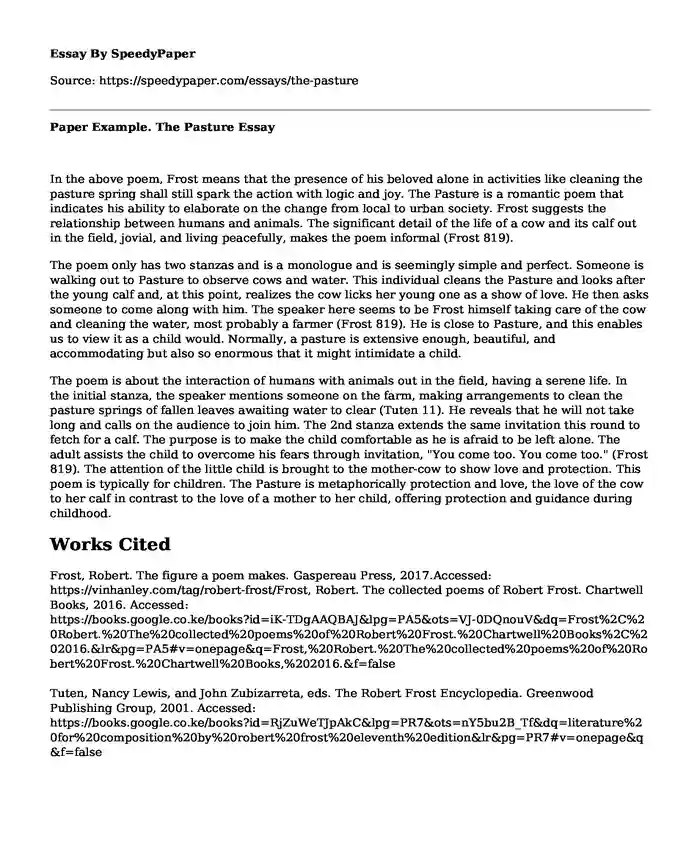
| Type of paper: | Thesis statement |
| Categories: | Poem Analysis Relationship |
| Pages: | 2 |
| Wordcount: | 496 words |
In the above poem, Frost means that the presence of his beloved alone in activities like cleaning the pasture spring shall still spark the action with logic and joy. The Pasture is a romantic poem that indicates his ability to elaborate on the change from local to urban society. Frost suggests the relationship between humans and animals. The significant detail of the life of a cow and its calf out in the field, jovial, and living peacefully, makes the poem informal (Frost 819).
The poem only has two stanzas and is a monologue and is seemingly simple and perfect. Someone is walking out to Pasture to observe cows and water. This individual cleans the Pasture and looks after the young calf and, at this point, realizes the cow licks her young one as a show of love. He then asks someone to come along with him. The speaker here seems to be Frost himself taking care of the cow and cleaning the water, most probably a farmer (Frost 819). He is close to Pasture, and this enables us to view it as a child would. Normally, a pasture is extensive enough, beautiful, and accommodating but also so enormous that it might intimidate a child.
The poem is about the interaction of humans with animals out in the field, having a serene life. In the initial stanza, the speaker mentions someone on the farm, making arrangements to clean the pasture springs of fallen leaves awaiting water to clear (Tuten 11). He reveals that he will not take long and calls on the audience to join him. The 2nd stanza extends the same invitation this round to fetch for a calf. The purpose is to make the child comfortable as he is afraid to be left alone. The adult assists the child to overcome his fears through invitation, "You come too. You come too." (Frost 819). The attention of the little child is brought to the mother-cow to show love and protection. This poem is typically for children. The Pasture is metaphorically protection and love, the love of the cow to her calf in contrast to the love of a mother to her child, offering protection and guidance during childhood.
Works Cited
Frost, Robert. The figure a poem makes. Gaspereau Press, 2017.Accessed: https://vinhanley.com/tag/robert-frost/Frost, Robert. The collected poems of Robert Frost. Chartwell Books, 2016. Accessed: https://books.google.co.ke/books?id=iK-TDgAAQBAJ&lpg=PA5&ots=VJ-0DQnouV&dq=Frost%2C%20Robert.%20The%20collected%20poems%20of%20Robert%20Frost.%20Chartwell%20Books%2C%202016.&lr&pg=PA5#v=onepage&q=Frost,%20Robert.%20The%20collected%20poems%20of%20Robert%20Frost.%20Chartwell%20Books,%202016.&f=false
Tuten, Nancy Lewis, and John Zubizarreta, eds. The Robert Frost Encyclopedia. Greenwood Publishing Group, 2001. Accessed: https://books.google.co.ke/books?id=RjZuWeTJpAkC&lpg=PR7&ots=nY5bu2B_Tf&dq=literature%20for%20composition%20by%20robert%20frost%20eleventh%20edition&lr&pg=PR7#v=onepage&q&f=false
Cite this page
Paper Example. The Pasture. (2023, May 21). Retrieved from https://speedypaper.net/essays/the-pasture
Request Removal
If you are the original author of this essay and no longer wish to have it published on the SpeedyPaper website, please click below to request its removal:
- Free Essay with the Discussion on the URSCI Exposition
- Physics Problems
- Theme Essay Sample on the Book Black Boy
- Free Essay Sample on Post-Trauma Stress Disorder Management
- Essay Sample on Natural Phenomenon
- Essay Sample on Role of Research in Criminal Justice System
- Essay Sample on Cross-Cultural Stereotypes and Communication
Popular categories




